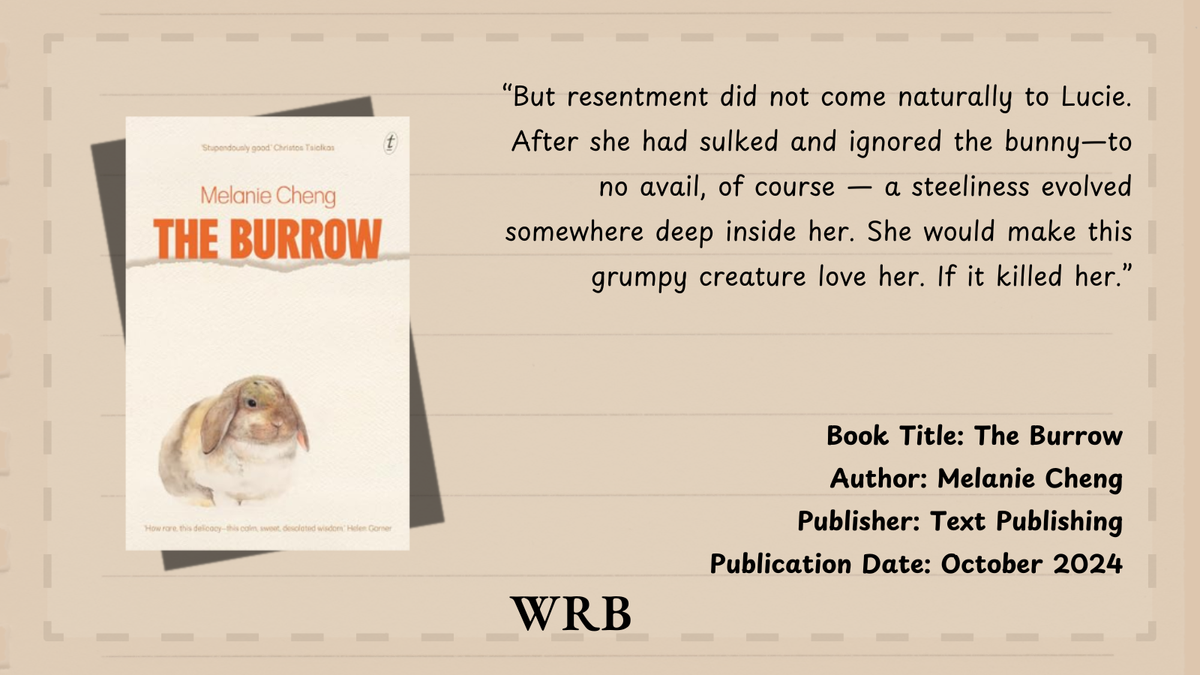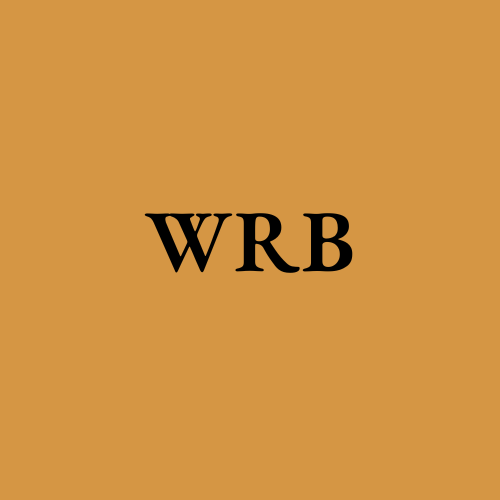Grief is a tender force in Melanie Cheng’s The Burrow
You can trust Cheng to be economical with her words. There isn’t a single throwaway remark in this book; every word weaves back into hitherto skipped stitches and opened seams.

Book Title: The Burrow
Author: Melanie Cheng
Publisher: Text Publishing
Publication Date: October 2024
There’s been a tragedy in the family, a loss.
The Burrow opens with Jin Lee, a doctor, husband and dad, trying to soothe the bruises of that loss by adopting a pet rabbit, who he’s driving home to his wife, Amy, and daughter, Lucie, in the middle of pandemic-induced lockdown. He’s scrutinising the flaws in this plan: rabbits aren’t known for their resilience; how can the family ensure its survival so they don’t have to mourn another loss?
Early on in this novella-length dispatch from the tumultuous lands of grief, we learn that the youngest of the Lee family, Ruby, died. That was 6 years ago. We’re not told how just yet, only offered faint context, and that’s a mercy. We ease into the fact of the loss, not unlike the characters we read about. Their memory of loss is not in the past but in the aftermath, and the aftermath of such profound loss is forever. The filial tensions are painfully palpable in the interpersonal dynamics. Jin is harbouring secrets, Amy is a silhouette of the person she used to be, Pauline is shrinking herself riddled with guilt, and Lucie finds herself in the vortex of this storm, growing up in a pandemic without a sister and with parents she cannot identify.
One wonders about grief’s lock-in period. It’s been 6 years; how has the family not excavated their grief during this period? How have they let it rot? How long can they let their non-sequitur delay the processing? Cheng has an underrated but masterful command over the plot, so all information arrives in due time.
We learn that love’s not lost. Jin kept Amy company in the clutches of grief, albeit in a quiet manner that has come to characterise emotions in this household. Despite his illicit dalliance, we are informed, he “had been absorbing her sobs like a thready pulse through the mattress.”
Amy’s trying her best to be a good mother to Lucie, aware that she isn’t introducing Lucie to grief’s workings, letting it lurk instead. She’s also battling a harsh brand of survivor guilt, given the conditions of Ruby’s death. She has also lost a chunk of self-identity as a writer, a dream she semi-rebelled to make reality.
Along with the rabbit's arrival, the plot is catalysed by Pauline, Amy’s mother, who is staying with the family to recover after an accident. We learn that Pauline isn’t just an accidental motif; she might have played a bigger part in the tragedy. And then there’s Lucie, of course, learning the contours of love, even if she has to push through the friction; we see her practice a crooked variation of sibling love on the bunny.
The main character in Melanie Cheng’s The Burrow is grief. You might think you’re learning about the life and times of the Lee family, but it’s really about the gentle fabric of grief weaving the tapestry of their lives. And it's a tapestry of emotional stasis, interspersed with moments of joy that none of them can bring themselves to embrace without guilt. Ruby’s dead, yes, but through her absence, she’s also a very alive part of this tapestry.
Cheng’s writing makes for a unique reading experience as she lets us in on the character’s past and their foibles. In the opening scene, we learn that Jin’s parents didn’t bring him up to be fond of animals. Quite the opposite, his mother “made him take a shower with a giant bar of Dettol soap” when she caught him patting a friend’s lab. So, in bringing home this pet rabbit, what is he trying to accomplish? Is he preemptively repairing some generational rupture? Is he hyper-vigilant to not parent his kid the way he was parented? Or, is he just keen to use the rabbit as a communication buffer within his broken family?
Then you see Lucie, and it dawns on you: it’s a silent nod to the awareness that childhood formative experiences can be so impressionable. That this reality, loaded with the loss of a sibling, a daughter, a granddaughter, is denting Lucie’s body and psyche, too. That there’s been an unfathomable loss, that an equally incomprehensible reconciliation is knowing there’s no one to blame.
Cheng’s breezy writing style, unburdened by heavy or cluttered prose, can trick you into believing that she’s nonchalant; she’s anything but. Cheng has always etched characters that are a little lost, but with the Lees, she is uninhibited. There’s no pretentious subtlety in the description of this family stuck in an emotional limbo. Cheng uses metaphors sparingly but effectively, like when Jin describes his pain to his cardiologist as “a toothache.” Cheng adds
There’s absolutely no anecdote, no sentence, no word wasted. It’s a global pandemic. The worst things that could happen are already happening. So when Amy takes the sick rabbit to a vet, she quickly gets over the vet’s judgment of her haste. When it's necessary, Cheng explains, “Her heart was thick and callused, and it would take a great deal more than the loss of a pet rabbit she’d known for less than two weeks to upset her.”
These details set up the novella as a winner. A lot of payoff awaits us as we read on. Cheng’s hold on her craft is visible in how well she alternates POVs, offers morsels of information so we can piece together how Ruby died, and lets us ease into empathising with her characters, which was her plan all along.
Often, though, she has to explain the grief to us like we’re a toddler:
Because the prose was borderline poetic, we didn’t mind the overexplaining. The imagery Cheng conjures, perhaps, leaves us wanting — afternoon described as “apricot light” — but the originality and context quickly compensate with their intensity. Jin, Amy and Pauline are bereft in ways only context can convey.
You can trust Cheng to be economical with her words. There isn’t a single throwaway remark in this book; every word weaves back into hitherto skipped stitches and opened seams. The novella’s coda delivers an exposition of grief and reconciliation with realistic momentum and a lesson within: the loss of Ruby has left a permanent scar, but it doesn’t have to be an ugly one too.
Book Title: The Burrow
Author: Melanie Cheng
Publisher: Text Publishing
Publication Date: October 2024
